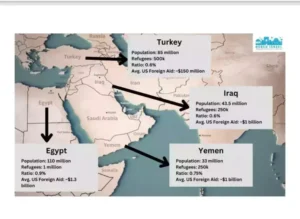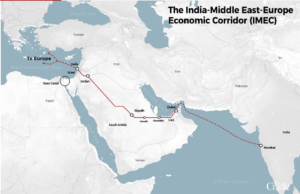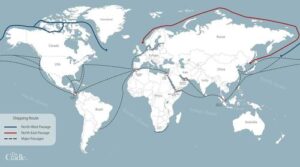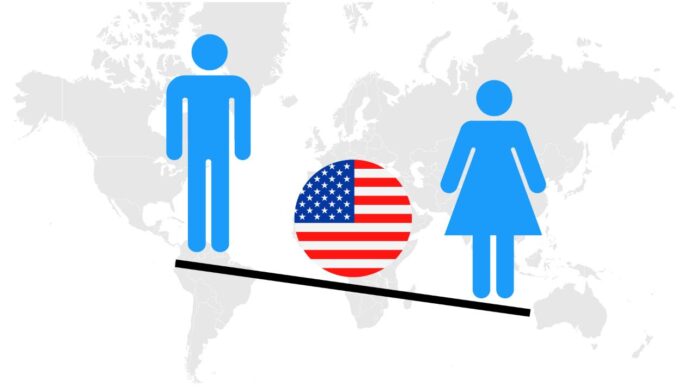Author: Daria Gușă
We were faced with many momentous and far-reaching events this year, but I have chosen to focus on the war in Gaza and the subsequent Red Sea blockade carried out by Houthi forces in Yemen, as they will certainly generate the most important societal and geoeconomic events of the beginning of 2024.
The war in Gaza is, without a doubt, the biggest and most consequential event of the latter part of 2023. The controversial Israeli Defense Minister, Yoav Gallant, recently declared that Israel was being attacked in a “multi-arena war” from seven areas, which he identified as Gaza, the West Bank, Lebanon, Syria, Iraq, Yemen and Iran, and that anyone who in any way acts against Israel is a potential target of the Israeli forces, thus it is easy to evaluate the potential for escalation of the content (https://www.ft.com/content/6932a369-f3f6-46e5-be1f-ce47e14e5ece). Complementary and at the same time, the Palestinian leader, Mahmoud Abbas, declared that this is the biggest suffering and threat that the Palestinian people have ever faced (https://news.sky.com/story/hamas-israel-war-palestinian-president-mahmoud-abbas-says-conflict-is-gaza-as-greater-than-war-of-extermination-13038105). And yes, the suffering of the people in the region must be put in the foreground, and violence against civilians must be unanimously and harshly condemned, but at the same time it is obvious that the changes induced by the war in Gaza are also societal geoeconomic.
Firstly, by assessing the war in Gaza, it is obvious that the West shall again face important societal consequences as a result of the influx of Palestinian refugees, but also Israeli immigrants. At the same time, the European countries simply cannot (and do not want to) take even more refugees, fact exemplified by Poland’s refusal to receive more Ukrainian migrants and Italy’s state of emergency regarding immigration. However, the exodus of Palestinian and Israeli citizens is ongoing and clearly directed towards European countries. The only other option for the resulting Palestinian and Israeli refugees is their repatriation in neighboring countries, however, the Middle Eastern countries categorically refuse to take in more refugees after the flood that they received following the conflicts in Yemen and Syria. The newspaper Israel Hayom, owned by one of Netanyahu’s close friends, declared that senior US lawmakers are planning to legally link the Gaza refugee resettlement to US aid to Arab countries. This means that the US would condition foreign aid to Egypt, Iraq, Yemen, Turkey, etc., on them accepting a cumulative 2 million potential Palestinian refugees, with the respective aid and number of refugees accepted by each country detailed in the picture below.

The American alleged proposal (see the picture above) also explicitly likens the situation to the 6 million Ukrainians that have fled due to the war in Ukraine, or to the refugees of the Syrian Civil War, thus justifying the planned exodus. The document published by Netanyahu’s buddy’s newspaper also blames the United Nations, namely the United Nations Relief and Works Agency for Palestine Refugees in the Near East (UNRWA) for perpetuating the conflict and deepening the refugee crisis, the document stating that the UNRWA is propagating the narrative that the Palestinians are refugees and not that they leaving out of their own volition to escape Hamas (the Israeli-American narrative), finally claiming that it must be shut down (https://www.israelhayom.com/2023/11/29/senior-us-lawmakers-review-plan-that-conditions-aid-on-arab-countries-receiving-gazans/).
Similarly, Ursula von der Leyen’s visit to the Middle East was also aimed at convincing Middle Eastern countries to take on the Palestinian refugees in the predictab;e case of a full exodus. Independent media reports that she offered bribes, in person, to Egypt’s and Jordan’s leaders – $10 billion and $5 billion respectively (https://new.thecradle.co/articles-id/15176). These desperate bribe attempts make it apparent that the Middle Eastern countries will not accept this proposal, as they understand that allowing this plan to be carried out invariably means turning their backs on the Palestinian cause, and, even worse, directly accepting that Palestine is Israeli soil. The only viable solution for Israel (and the US) is further pressuring their economically weakened (due to the Ukraine war) European allies to take in the majority of these refugees. So the creation of more hardships for the EU is forecasted!
It is important to emphasize that the potential overall consequences of the war in Gaza are still hard to precisely evaluate as long as there is still no concrete and definite proof of how this conflict started and how exactly the peculiar Hamas attacks of October 7 were successful, considering that the Hamas forces have not had any success in their operations against Israel for the last few decades. In addition, we must consider the inexplicable fact that the Israelis ignored the Egyptian intelligence warnings regarding a possible Hamas attack (https://www.timesofisrael.com/egypt-intelligence-official-says-israel-ignored-repeated-warnings-of-something-big/). There is still no logical and feasible explanation as to why the Israel leadership did not take these warnings seriously, which makes the accusations that Netanyahu was actually an accomplice in the deliberate initiation of the Gaza war credible. These aspects of the war need to be cleared up as soon as possible if we want to be able to continue to implement efficient and realist solutions.
Secondly, the Red Sea blockade, an extremely serious event that results from the Gaza war, will have great consequences on the world economy, with particular detriments to the Western economies in addition to the Israeli one. The Houthi blockade of the Bab al-Mandeb Strait started on November 19, but the notable escalation of attacks of the last few days already has catastrophic effects on global shipping and supply chains. The Houthis have made it clear that any Israel-affiliated or Israel-destined vessel will be intercepted, but ships from the Global South, including Chinese, Russian and Iranian, will be allowed to pass across the Bab al-Mandeb strait, which connects the Mediterranean Sea and the Red Sea to the Arabian Sea and Indian Ocean. Thus, the Houthis, along with obvious Iranian support and sponsorship, have managed to block a great part of the West’s trade very simply and efficiently, and at the same time generate incredible damage that will weaken Israel’s economy. Israel’s economy relies mainly on exports, and most of the necessary goods come through maritime shipping. The International Trade Administration has declared that Israel is not self-sufficient in terms of agriculture, but is reliant on trade to feed its people, so the resulting difficulties for Israel are immediate (https://www.trade.gov/country-commercial-guides/israel-agriculture). Israel’s third largest port, Eilat has already seen an 85 percent drop in activity due to the Houthi attacks (https://www.newarab.com/news/israels-eilat-port-sees-85-activity-drop-amid-houthi-raids). Although not near as large as Haifa or Ashdod, Eilat is the only gateway that Israel has to the East.
So we understand that the Houthi rebels have a fundamental role in this operation that aims to punish Israel, and the West portrays them as a radical, revolutionary and terrorist movement. In actuality, it is impossible to deny that the Houthis are now the de facto government in Yemen, as 80% of Yemen’s population lives under the functioning, but highly repressive, Houthi government, fact admitted even by the Brookings Institution, an American think tank funded by the Bill and Melinda Gates Foundation (https://www.brookings.edu/articles/the-houthis-after-the-yemeni-cease-fire/#:~:text=The%20Houthis%20seem%20prepared%20to,Arabia%20to%20combat%20during%202023). Although the Houthis are Shia, and their current power is seen as the result of Iran’s backing (as a way for the media to frame the conflict in religious terms), they are actually from a different sect of Shia than Iran, a sect closer in its beliefs to the Sunni, fact which brings them closer to the rest of the Muslim world. The Houthis actually gained power in 2014 through a very strong anti-corruption agenda in a time of growing dissatisfaction with the puppet-dictator put into place by Saudi Arabia, and they are still involved in fighting that brings about many civilian casualties.
Further, I shall present a bigger picture of how the global trade corridor restructuring as a result of the Houthi blockade in the Red Sea shall affect the global economy. The US Energy Information Administration (EIA) declared that the Bab al-Mandeb Strait is a strategic route, with most exports of petroleum and natural gas from the Persian Gulf transiting the Suez Canal or the SUMED Pipeline passing through both the Bab al-Mandeb and the Strait of Hormuz on their way to Europe and the US. The total petroleum flows through the Bab al-Mandeb Strait account for about 9% of total seaborne-traded petroleum (https://www.eia.gov/todayinenergy/detail.php?id=41073#:~:text=The%20Bab%20el%2DMandeb%20Strait,oil%20and%20natural%20gas%20shipments). In adition, about 12% of global trade passes through the Suez Canal, which cannot be accessed by western-bound ships without access to Bab al-Mandeb. Major shipping companies, including MSC (which owns about 20% of global cargo fleets), have begun to sail south around the Cape of Good Hope to avoit the Bab al-Mandeb, adding 44 days and 20 000 km to their trip which resulting huge costs and delays. Other companies, like oil magnate BP, have paused all transit through the Red Sea, with crude oil prices raising accordingly (https://www.newarab.com/news/red-sea-attacks-gaza-forcing-costly-ship-reroutes).
I can also say that the “Houthi blockade” has embarassed the US: The US has put together a task force of 20 countries, Operation Prosperity Guardian (OPG), to defend shipping from Houthi Attacks, yet more and more shipping companies are forgoing the route as the OPG is unable to properly protect them (https://www.theguardian.com/us-news/2023/dec/19/us-announces-naval-coalition-to-defend-red-sea-shipping-from-houthi-attacks#:~:text=US%20announces%20naval%20coalition%20to%20defend%20Red%20Sea%20shipping%20from%20Houthi%20attacks,-Egypt%20and%20Saudi&text=The%20US%20has%20announced%20the,rebel%20Houthis%20on%20merchant%20shipping). Nearly half of the OPG countries have so far not come forward to acknowledge their contributions, and Italy and Spain, who were initially listed as contributors to OPG, have publicly distanced themselves from the task force (https://www.newarab.com/news/us-allies-wary-red-sea-force-public-opposes-gaza-war). Saudi Arabia and UAE, the most needed countries in this operation, have not accepted to become part of this maritime force that challenges the Houthis, as Houthi missiles are capable of hitting Saudi and Emirati oil fields. Egypt has also not accepted to be part of OPG! It is feasible to believe that the aforementioned countries know that Russia and Iran are in possession of underwater drones, which they have in position, meaning that even the advanced submarines and aircraft carriers that the US has would not be able to keep the Bab al-Mandeb open to their western allies.
In light of these economic barriers created by Iran’s Houthi allies, Joni Ernst, a US Senator, declared that the US needs to be aggressive with Iran. US Senators Lindsey Graham and Richard Blumenthal urged President Biden to attack Iran in case an American soldier was killed in any of the fronts in the Middle East, creating a draft in Senate that requires no further Congressional authorization for Biden to basically start a war with Iran! (https://www.iranintl.com/en/202311176957) Graham had additionally called for an even harder approach towards Tehran, suggesting that the US should bomb the IRGC inside Iran and “blow Iran off the map” as a result of the Iranian allies fight against Israeli and American troops (https://www.iranintl.com/en/202312283124). The threat of a wider war in the region has increased, with unthinkable consequences for the world in the case of direct attacks between US and Iran.
The other trade route that western-bound ships could follow under normal circumstances is through the Strait of Hormuz, using the India-Middle East-Europe Economic Corridor (IMEC), launched at the last G20 Summit which starts from Mumbai and goes through the Strait of Hormuz to Dubai. The IMEC was launched as a way to undermine China’s Belt and Road Initiative (BRI) and Russia and Iran’s International North-South Transportation Corridor (INTSC) – both cheaper and more efficient than IMEC – but because of the conflict in Gaza it has been declared ‘dead-on-arrival’, with Saudi Arabia incapable of collaborating with Israel now (https://thediplomat.com/2023/10/is-the-india-middle-east-europe-economic-corridor-dead-on-arrival/).

Still, important developments are to be expected in the Strait of Hormuz, the 40km corridor between Iran and UAE. The EIA interestingly republished an article on the Strait of Hormuz from four years ago last month, declaring it the world’s most important oil transit chokepoint, with 21% of global petroleum liquids consumption passing through it every day. Only Saudi Arabia and the United Arab Emirates (UAE) have operating pipelines that can circumvent the Strait of Hormuz, yet these are nowhere near big enough to take over the great volume of oil that passes daily. The Americans are actually extremely worried, as 11% of US crude oil imports pass precisely through the Strait of Hormuz (https://www.eia.gov/todayinenergy/detail.php?id=61002#:~:text=the%20Arabian%20Sea.-,The%20Strait%20of%20Hormuz%20is%20the%20world’s%20most%20important%20oil,of%20global%20petroleum%20liquids%20consumption). If Iran decided to also block the Strait of Hormuz in addition to Bab al-Mandeb, the price of oil would grow from today’s $80 a barrel to at least $500 a barrel, crashing the international transport system, and causing a number of other economic crises (https://www.zerohedge.com/geopolitical/escobar-how-yemen-changed-everything).
I also have to mention that Iran has threatened to also close the Mediterranean Sea and the Strait of Gibraltar in retaliation for the ongoing war in the Gaza Strip, further complicating matters for Israel and its allies. (https://nypost.com/2023/12/23/news/iran-threatens-to-close-mediterranean-sea-over-gaza-war/). It is unclear how Tehran plans to do that, as Morocco, the only country other than Spain with access to the Strait of Gibraltar, does not have diplomatic ties with Tehran due to Tehran’s support for Western Sahara forces, but is very close to Israel, with more than one million Israelis having Moroccan background. It is clear, however, that blockades of the strait by bombing and immobilizing some ships in transit are also being considered.
These catastrophic economic effects caused by the Yemeni strike can be assumed to have been coordinated between the newly extended BRICS+ members: Russia, China, Iran, Saudi Arabia and UAE. I want to remind you that one of Putin’s declarations at the BRICS summit in Johannesburg was the establishment of a permanent BRICS+ transport commission that would develop global transport corridors during Russia’s chairmanship in 2024. This could have been the plan all along: redirecting global trade to the Northern Sea Route (the “Arctic Silk Road”), which, although operational since 2007, has only now become a necessary alternative for the major trade routes through the Suez. The Northern Sea Route’s terminals are all on the Russian northern coast, and Russia has unveiled five nuclear-powered icebreakers which will make the passage viable for year-round navigation. Thus, the Europeans only have two options for transporting Asian imports: either experience the associated costs and delays to sailing around the Cape of Good Hope, or use Russia’s faster and cheaper Northern Sea Route.

I have said before and I say it again: the BRICS+ states have a big plan to achieve in 2024, with the aim of proving that they are now the ones who control the global economy. The example of the blockade is a demonstration that the newly enlarged alliance was able to counter economically, if not politically, much of the West’s support for Israel with a simple move in the Bab el Mandeb Strait. Obvious and efficient!
In conclusion, I underline once again the societal consequences of the war in Gaza: we shall be confronted with a great number of Palestinian refugees, and, although the West is solidary with the Palestinian plight, it is obvious that it lives under the potential dangers of Islamic extremism and refuses to take in any further refugees. It is also important to note that the aero-maritime Schengen agreement, miraculously offered to Romania and Bulgaria through the so-called significant concessions made by Austria and Netherlands, seems to hide a secret agreement which includes the acceptance of Romania and Bulgaria of a certain number of the refugees that Austria and Netherlands harbor. This refugee relocation will generate great social tensions in these two NATO and EU countries in 2024, which until now were protected from such social convulsions. The economic effects of the Red Sea blockade should also not be underestimated, as they obviously do not only regard naval access, but also a radical increase in prices in the West as a result of the higher transportation costs. If alternative transport routes such as the “Arctic Silk Road” will be preferred, that begs the question: how will new security measures be implemented? We can’t forget that the “Arctic Silk Road” is under Russia’s almost exclusive control, and Moscow is seen as an opponent or even an enemy by the West. Only time will be able to tell.
But we will discuss all this at length in the coming weeks, and even if this forecast is not so favorable for us Westerners, I wish everyone a Happy New Year! May 2024 be a productive year for us all!











